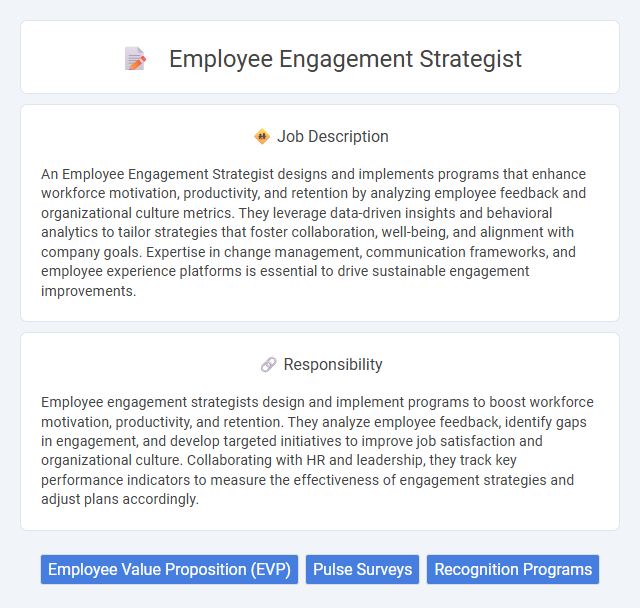
An Employee Engagement Strategist designs and implements programs that enhance workforce motivation, productivity, and retention by analyzing employee feedback and organizational culture metrics. They leverage data-driven insights and behavioral analytics to tailor strategies that foster collaboration, well-being, and alignment with company goals. Expertise in change management, communication frameworks, and employee experience platforms is essential to drive sustainable engagement improvements.
Individuals who thrive in collaborative environments and enjoy fostering positive workplace relationships are likely suitable for an employee engagement strategist role. Those with strong communication skills and a genuine interest in organizational culture may find this position aligns well with their strengths. People who prefer routine tasks or limited interpersonal interaction might face challenges in adapting to the demands of this job.
Qualification
An Employee Engagement Strategist typically requires a bachelor's degree in human resources, organizational psychology, or business management, with advanced certifications such as SHRM-CP or CIPD highly valued. Proven experience in designing and implementing employee engagement programs, combined with strong analytical skills to assess workforce metrics, is essential. Expertise in communication, change management, and familiarity with employee feedback tools enhances the ability to drive culture improvement and boost productivity.
Responsibility
Employee engagement strategists design and implement programs to boost workforce motivation, productivity, and retention. They analyze employee feedback, identify gaps in engagement, and develop targeted initiatives to improve job satisfaction and organizational culture. Collaborating with HR and leadership, they track key performance indicators to measure the effectiveness of engagement strategies and adjust plans accordingly.
Benefit
Employee engagement strategist roles likely increase organizational productivity by fostering a motivated and committed workforce. Their strategies probably improve employee satisfaction and reduce turnover rates, enhancing overall company culture. Effective engagement initiatives could lead to higher profitability and better talent retention.
Challenge
Employee engagement strategists likely face the challenge of aligning diverse workforce motivations with organizational goals while maintaining high morale. They probably need to analyze complex employee data to identify engagement gaps and design effective interventions. Balancing resource constraints with the demand for innovative engagement solutions may also be a significant obstacle.
Career Advancement
Employee engagement strategists play a crucial role in enhancing workforce productivity and satisfaction, directly impacting organizational success. Mastery of data-driven engagement techniques and advanced leadership skills opens pathways to senior HR roles such as Director of Employee Experience or Chief People Officer. Continuous professional development and certifications in organizational psychology or talent management significantly boost career advancement opportunities within competitive corporate environments.
Key Terms
Employee Value Proposition (EVP)
An Employee Engagement Strategist specializes in designing and implementing Employee Value Propositions (EVP) that attract, retain, and motivate top talent by aligning company culture, benefits, and career development opportunities with employee needs. They analyze workforce data and feedback to continuously enhance EVP elements, ensuring competitive positioning in the labor market. Effective EVP strategies improve overall employee satisfaction, reduce turnover rates, and increase organizational productivity.
Pulse Surveys
The Employee Engagement Strategist leverages pulse surveys to gather real-time feedback, enabling organizations to monitor workforce sentiments and identify areas needing improvement. By analyzing pulse survey data, this role designs targeted initiatives that boost morale, enhance communication, and increase overall productivity. Expertise in survey methodology and data interpretation ensures actionable insights that drive sustained employee engagement and retention.
Recognition Programs
Employee engagement strategists develop and implement recognition programs to boost morale, increase productivity, and reduce turnover rates within organizations. These programs are designed using data-driven insights to tailor rewards that resonate with employee values and promote a culture of appreciation. Successful recognition initiatives have been shown to improve employee satisfaction scores by up to 30% and directly contribute to higher retention and overall organizational performance.
 kuljobs.com
kuljobs.com